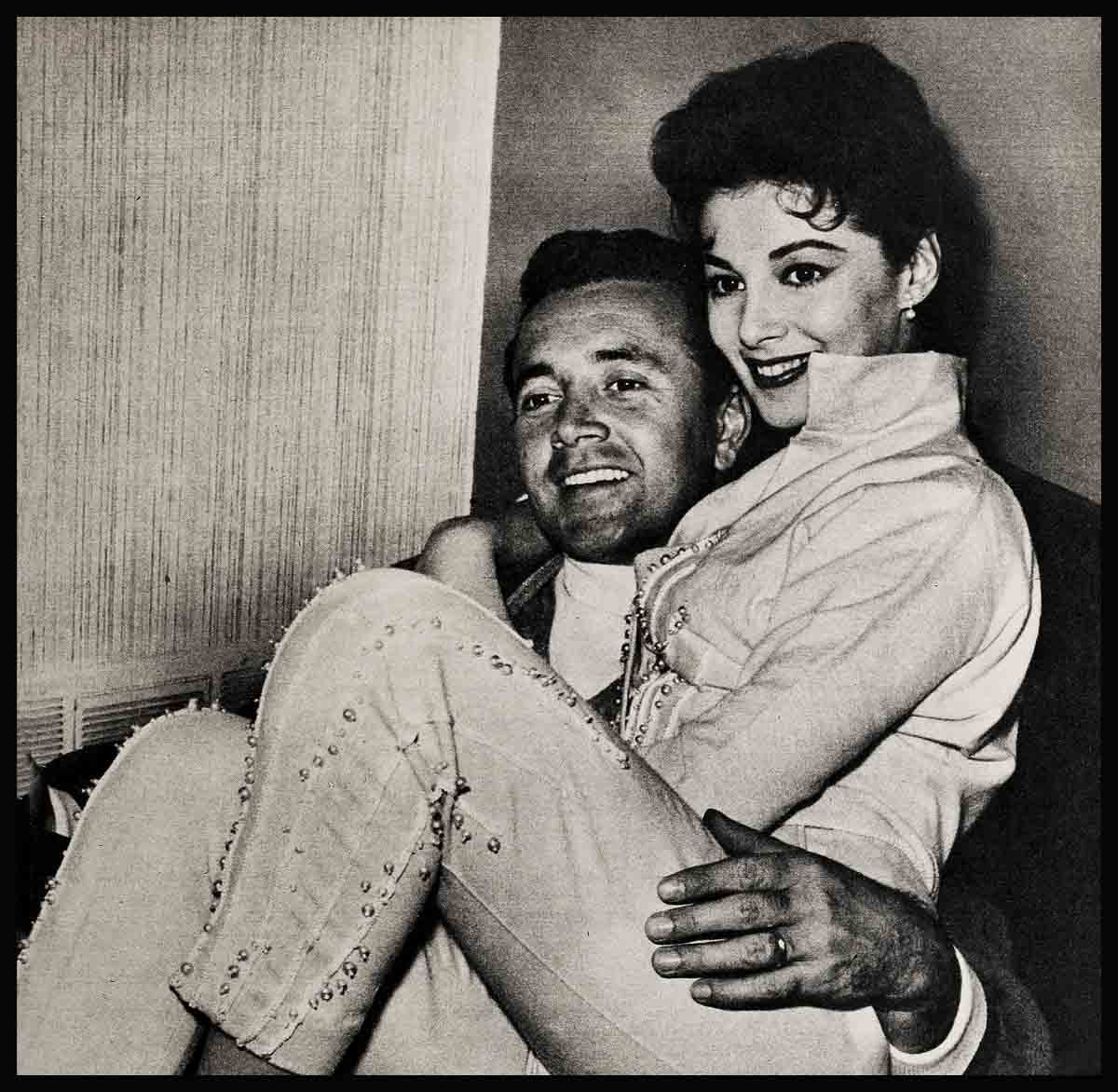
The Way Of A Bride—Pier Angeli & Vic Damone
EDITOR’S NOTE: Pier Angeli was flying to Palm Springs to join Vic Damone in the home he had picked out for them. Then suddenly the happiest story turned into tragedy. Crossing the mountain range just five minutes out of the Palm Springs Airport the plane struck turbulent weather and Pier was thrown against a bulkhead. She suffered a fracture of several bones in her pelvic area and it is anticipated that she will remain in the Desert Hospital for almost a month. At this time it is impossible for anyone to say whether her baby can be saved. Everyone knew how much Pier and Vic had longed for a child. This story was written just before the fateful flight—we believe Pier would want you to read it on the happy note, the way it was written.
Hearing her husband’s voice through the open doorway, Pier paused for a puzzled moment. First, Vic was alone. Second, the words sounded strange. “What do you say to your father? You won’t go to bed? You say no, to your daddy?! Wait till I tell your mother—”
She flew in to find him, all red in the face, waggling a finger at the floor. “My goodness, who are you talking to?”
“Our son, our daughter, how do I know? All I know is this baby has no education whatever.”
“But he isn’t born yet!”
“Still, he should learn manners.”
She collapsed in glee. While the routine’s no longer new, it continues to enchant her. She suspects that’s why Vic dreamed it up in the first place. He also dreamed up a child with a will of its own, which makes for livelier action. “You don’t want to eat your soup?” he demands of the floor, scoops up an armful of air and deposits it in a visionary highchair. “You want daddy to feed you?”
So Pier gets into the act. “He threw away the spoon, il bambino caro.” Then she feels of Vic’s forehead and her own. “You think we have fever?”
If so, it’s the normal fever of expectant parents. The baby’s due next August. Which of the two is more delirious remains an academic question until the day dawns when you can measure pure joy. In Vegas, where Vic was singing, Pier didn’t feel too well and flew home for a day to see the doctor, who promised to telephone her. The call came as she sat with Vic between shows. On a cloud of glory she floated back to the table, mildly amazed to hear plain language from her throat instead of hosannas. “Vic, you’re going to be a father. The doctor wants to talk to you.” He sat like a stone. Exactly like a stone, except for the eyes on fire. “Go, Vic, The doctor wants to talk to you.”
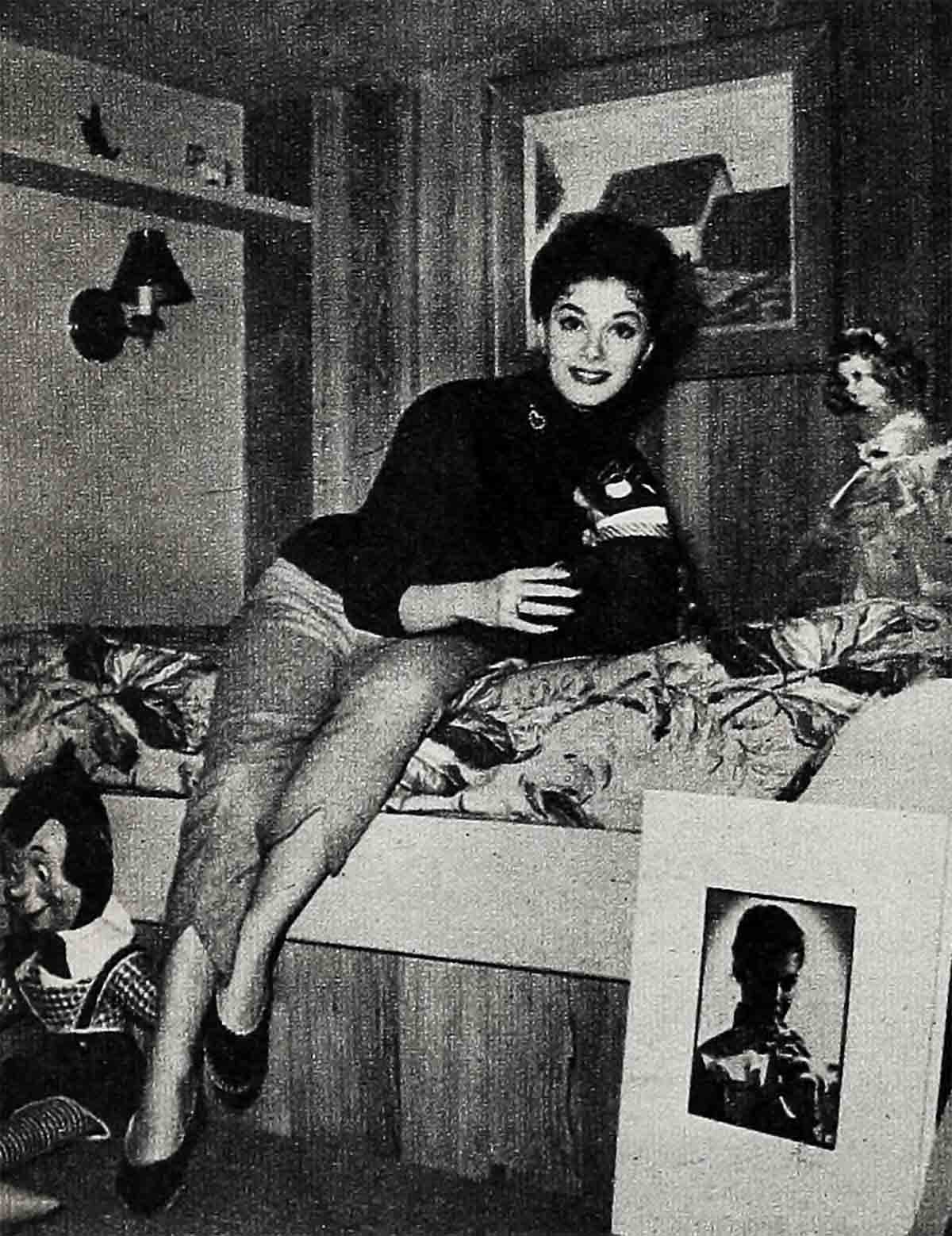
“I can’t move,” he moaned, but. eventually made it, and returned, bearing aloft a glass of milk. “Here, you must drink this. You must drink for two.”
“Suppose the baby isn’t hungry?”
“The baby’s starving. I asked him. He told me si, si.”
Though they say he because most people do, Vic wants a girl who’ll look like Pier. She insists on a boy who’ll look like him. A boy he agrees to, if needs must. “But not with my nose.” To ward off the nose, he took a cue from Madre, as he calls Pier’s mother. While carrying the twins, Madre surrounded herself with pictures of beautiful babies. Out of a magazine, Vic scissored the picture of a beautiful baby and laid it before his wife. Instead of coos, he got an explosion of mirth. “You don’t like him?”
“He’s wonderful!”
“Then what?”
“Look at us both. How will we two ever get a blond with blue eyes?”
“Simple. As.a little boy, I was blond.”
Love works miracles. In tribute to the blond youngster who grew up to be her dark husband, Pier has got Blue-Eyes taped securely to the foot of her bed.
Brows rose all over Hollywood when her engagement was announced. Objective and reasonable, she recognizes the point of view of outsiders. “They ask, my goodness, what happened, Pier was just going with other people. They have a right to ask. Because Vic and I, only we know all as it happened.”
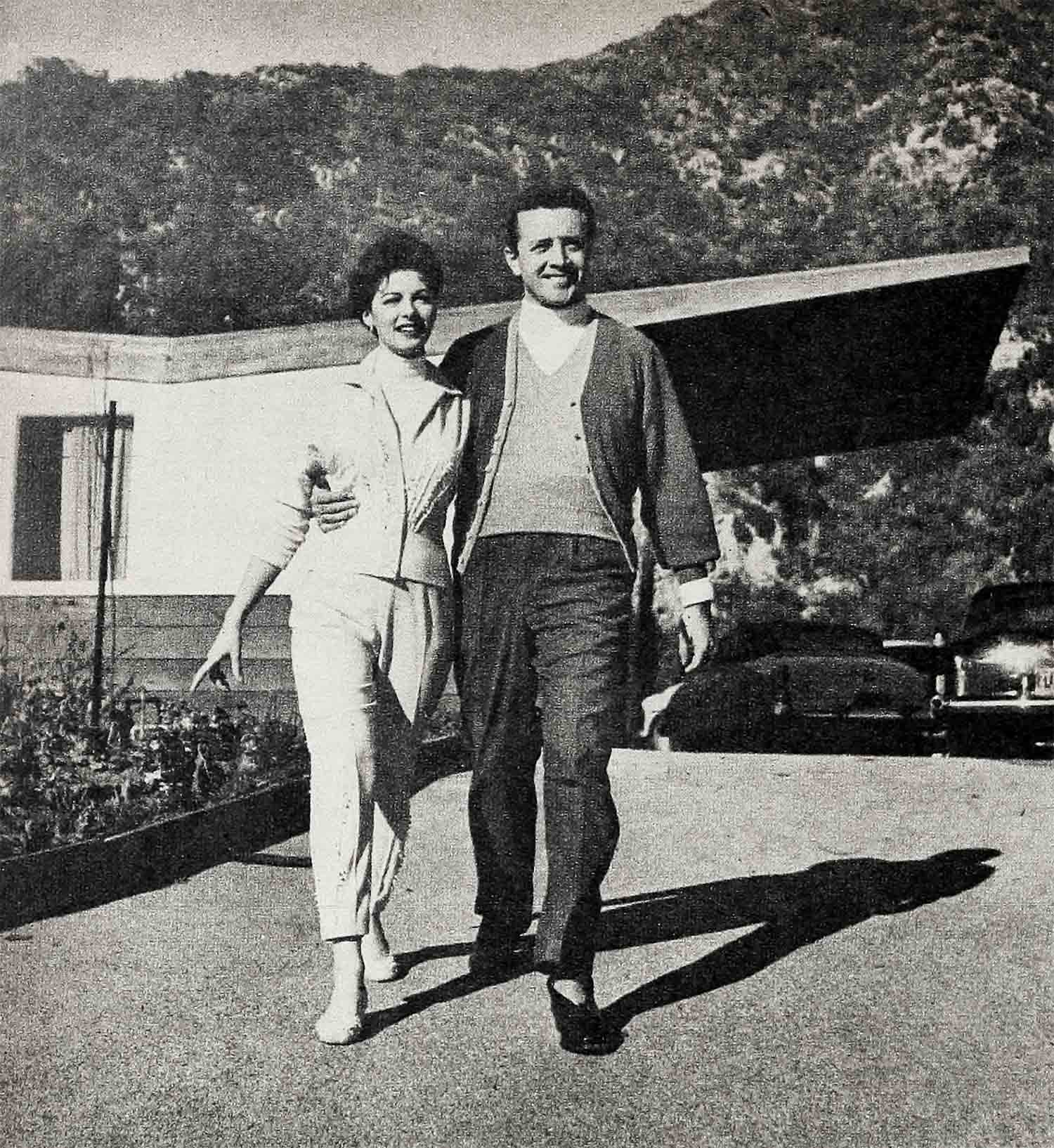
Far from plunging into marriage, she hesitated on its brink. Impulsive she may be, but not when it comes to that sacred covenant. In Germany almost three years ago, Vic asked her to be his wife. She was working in The Devil Makes Three, he was in the Army. He fell hard. She was sufficiently attracted to see him almost every night for three months. Rumor had Mrs. Pierangeli breaking it up, but rumor has always been hard on Pier’s mother. True, she thought her daughter not yet ready for marriage. Daughter, however, thinks for herself and the answer she gave Vic was her own. “You have still a year to serve. Together a few weeks, then a long parting—this is no way to begin. We are both young. If it is meant to be, it will come about.” Before leaving, she gave him a friendship ring.
Being no girl to sit home counting her fingers, of course she dated and dreamed, developed the normal crushes, got them out of her system, but never looked marriage in the face until Vic asked her again that day in the Retake Room.
“All afternoon I was on the set, hearing him sing an Italian lullaby which moved my heart. The song too, but the singer more, his eyes so soft, his voice so tender. As we danced in the Retake Room, he asked me, and though something inside said yes, my lips said, ‘No, it’s too quick.’ That night I talked to my father. My father died four and a half years ago. He is buried in a place in northern Italy. But I loved him so greatly that his life is around me. For me he will live while I live. When it’s something important, I ask him and it seems to me that he answers. ‘Father,’ I asked, ‘what do you think I should do?’ And it came to me how I always prayed God to let me find someone both strong and kind, who will love and protect me. Then I saw Vic’s face, so true, so gentle, and the ring I gave him which for two and a half years he never took off, and I felt to run to him with all my love, and I knew the answer.”
But Pier is realistic as well as romantic. Her face, with its swiftly changing moods, turned pensive. “You go to marriage, and who can give you the promise of happiness? You are engaged, and everything is rosy. Then come such thoughts—will the person you love understand you? You look back to the other life and you’re frightened a little. I, for instance, am very close with my mother and sisters. To be separated, I think I will cry every day. I think I will even miss to hear my mother tell and tell, ‘Why don’t you put on your sweater?’—‘The shoes are too high.’ But I miss nothing. When my mother told, sometimes I got impatient. This is the daughter’s way. When Vic tells, I like it. This is the way of the bride. Once my mother touched me to fix my hair. I said: ‘Don’t touch me. Only Vic can touch me.’ It was of course a joke and we both laughed as she fixed my hair. But in the bottom of the joke lies a little truth.
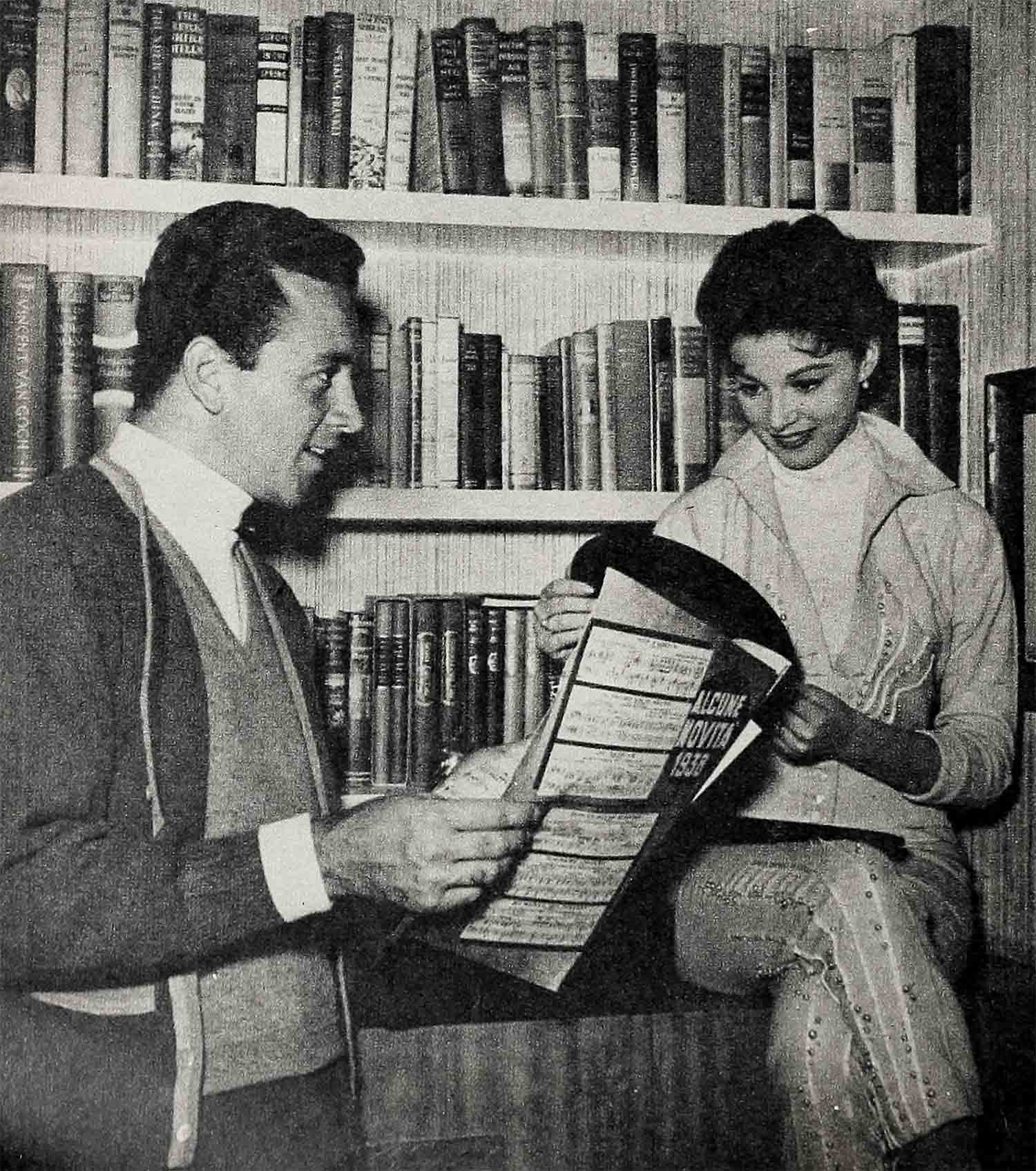
“The truth is that a husband is to his wife as nobody else. I never thought you could be so happy in the world, only in a dream. Sometimes it feels like a dream. In the restaurant he says, ‘Now I will take you home.’ For a minute I think, home to my mother and sisters. But no. Home to Vic and me, and it comes over me again all new and beautiful. And how I worried if he will understand me. If he understands me!” She hugged herself, a small candle aglow. “I have only to look, and he knows what it means. Sometimes without looking. From the first day.”
On the first day they planned to drive from their wedding reception directly to Las Vegas. In the car, Vic said: “Let’s stop at the house first.” A sensitive soul herself, Pier also understood without looking. To carry her into the bridal suite of The Sands, with bellboys agape—no, thank you, from both. Across their own threshold, they two alone, that would be right.
Part way up they ran out of gas. “I think someone did a trick on us,” said Pier.
“Can you walk, Mrs. Damone?”
“Or else why did the dear Lord give me feet?”
They walked for fifteen minutes. Having been borne over the threshold, Pier suddenly felt too tired to move. Not from walking or climbing steps. From too many emotions. But she wouldn’t say so. “We’ll sit a little, then we’ll start.”
She didn’t have to say so. “Would you like to eat dinner here and go tomorrow?”
“Vic, if you ever lose your voice, God forbid, you can be a magician.”
The magician had the car rescued and dinner sent in from an Italian restaurant—lasagna and veal, salad and fruit—and a bottle of champagne, compliments of the innkeeper. Neither likes to drink. But since a celebration indicates champagne, each took a sip from the same glass. “To you,” she said.
“To us,” he amended, “and to our marriage.”
They’re living now in the house leased from Bob Arthur just ten days before their wedding. The agent had been hunting for six weeks. At six-thirty one evening he called Pier. “This place is high in the hills and there may be too many steps, but take a look anyway.” She drove up alone; what use to bother Vic if it wasn’t right? Yes, there were too many steps— until she reached the top and caught her breath because it looked like Italy—green-girdled, drenched in stillness except for the singing birds, and all the little houses alight below. At the golf course she found Vic hitting some balls around. “Let’s go see this house. Outside, it’s like heaven.”
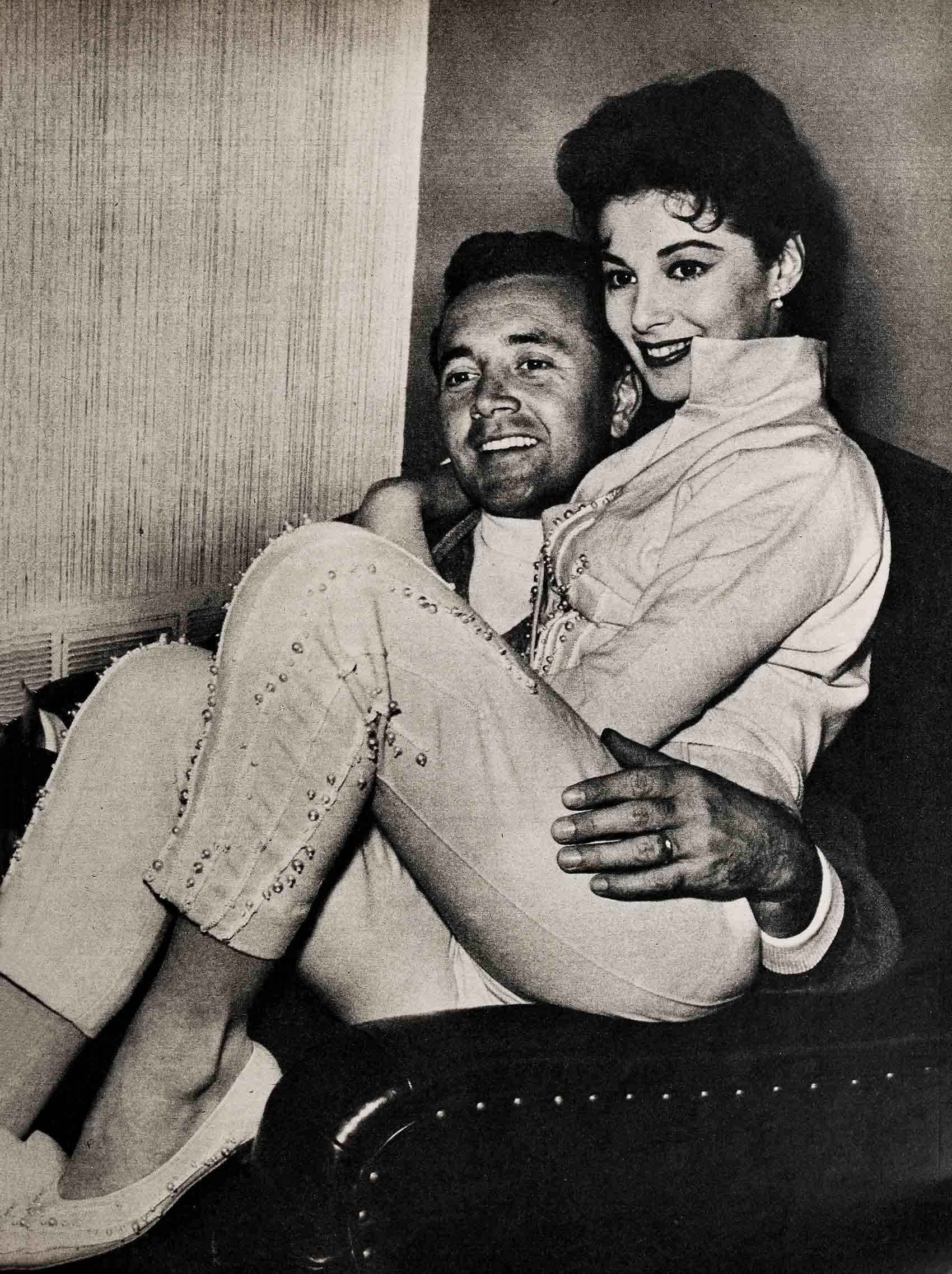
“And inside?”
“I forgot to look. Never mind. We’ll look together.”
Inside it was fine—a real honeymoon house, just big enough for now. Half an hour later Vic signed the lease. While they were away, Mrs. Pierangeli moved their clothes in and refurnished the bedroom by her daughter’s blueprint—all white with pink velvet, tulle curtains and femininity. “Maybe a little too feminine,” Pier admits. “But Vic thinks a bride should have her way about this.” Returning, she engaged a maid, installed a cat since Vic is allergic to dogs, and was all set for domesticity.
Or so she thought, discounting week ends when the maid is.off. This brought about a small crisis. Pier can cook if she wants to. “But when I cook, the smell of the food makes me that I can’t eat.” So she prefers to have someone do it for her.
Came Saturday. “I would like,” said the man of the house, “three eggs over easy. With sausage.”
Masking her dismay, she repaired to the kitchen. In Italy you don’t eat eggs for breakfast. What was this eggs-over-easy? To ask him would have made her feel stupid; she couldn’t ask. For reasons clear only to herself, she decided they must be eggs with a little cheese. When she turned them over, they came out scrambled. Ditching them, she tried three more. Scrambled again. Meantime the sausage, sizzling for fifteen minutes, had stiffened to rock, and how long can a man wait for his breakfast? Into the dining room she marched and dumped the mess under his nose. An excellent cook himself, Vic eyed it dubiously. “He thinks,” she thought, “what kind of wife did I marry, at least she could do eggs!”—and fled to the hills where he found her weeping like a fountain, “I’ll never do you anything again.”
He tilted her chin. “That’s intelligent. Don’t you want to learn?” With a big handkerchief, he dried her eyes, kissed them, took her home and showed her how to fix eggs over easy. After which she made his breakfast every week end, but drew the line at dinner. On Saturdays they’d go to her mother, on Sundays to Pep de Lucia’s. Tears were banished by decree of Vic. “You must always smile; I can’t bear to see you sad. If something goes wrong, don’t run away from me, tell me. We’ll sit down together, and together we’ll decide how to make it right. Without crying, without anger. Okay?”
Before long, she was trying out the method. “Vic, I have been unhappy today.”
“Who hurt you?”
“My husband. Why do you say four and come home at five? Don’t be like my mother. My mother says six and arrives at eight when all the food is gone.”
“We’ll send out for more food.”
“No, I am serious, and I also see your side. You have been so long alone, answering to no one. I understand that for you it’s a big thing even to say, ‘I’ll be home at four.’ I don’t care if you’re busy till five or seven or ten. I would only like, when you say four, to be here at four. If you’re late, I worry, I think accidents, my heart goes too fast—”
Since then, he says four and gets home by three-fifty.
To Vic, she’s Ahnnah, not Pier—or more often, Ahnnah-baby. Our English Anna sounds flat, but the Italian caresses it to softness. She’s teaching him Italian and he understands all she says—when she speaks slowly. He’s teaching her chess.
While he filled an engagement at the Cocoanut Grove, life slipped into its routine. For Vic, there was work. For Pier no more pictures were planned before the baby. But time didn’t hang heavy. She read a lot, listened to music, knitted, cleaned house—which, as opposed to cooking, she enjoys—and tried out her voice. As a child of ten she sang on Radio Italy and cherished a secret hope that some day. she may be able to sing with Vic. Alone, she’d carol away, thinking, “I’ll show him.” Given the chance, she’s too shy to utter a chirp.
Three times a week he rehearsed with piano and drummer—always at the pianist’s house until Christmas time, when there in the living room, cellophaned and beribboned, stood their own piano, a gift from Madre. The fact that neither plays more than the simplest scale failed to dim their pleasure. Now Vic could rehearse at home with Pier in the room—an advantage too obvious to go into. But when he records, he wants her to disappear. “My wife mixes me up. I look at her and forget my words.” She would take her dismissal as the compliment it was, and an added indication that they were meant for each other, since she feels the same way. In a big scene she would never want Vic around. “It would make me too self-conscience,” she explains gravely.
Only twice did she go to the Grove to hear him sing. For the rest, she waited at home, because down there she had no one to sit with and Vic didn’t like her sitting by herself. Nor does he much care about having her stared at, even when he’s right beside her as natural guardian. In a restaurant, he’ll sight some stranger giving her the once over. Down go knife and fork. “Why is he looking?”
“He has eyes, he looks. Why don’t you eat?”
“I can’t stand him.”
“You never looked at a girl before you married?”
“That’s different. She wasn’t my wife. Wait, I’ll fix him.” He shifts her so the stranger gets a clear view of her back—a trick which reduces Pier to giggles and restores her husband to perfect humor.
This is one of the games of love. Another was their ritual each night before he left. Pier would hang on to him tight. “You know what happens now? Little animals crawl round the windows. The wind-goes ooh-ooh. There are birds with big eyes—owls. I don’t like owls.”
“Are you frightened?”
“No. For this reason I got the cat.”
“Just the same, you must lock yourself in the bedroom. I won’t go until I hear the click of the door. Are you locked?”
“I am locked. Goodnight. God bless you.”
“God bless you.” For however brief a parting, these are the words they use.
Between shows he’d call her. “What are you doing?”
Obligingly she’d answer, “I just finished to paint the walls. Now I start the ceiling.”
“Don’t go to sleep. Wait for me. Watch TV.”
“Nothing is on,” she’d tease.
But she’d wait, even though forced to prop her lids open. For one thing, being locked, she’d have to wake up anyway to open the door. For another, Vic always brought home something to eat—like a big pizza. Besides, he’d expect to find a note on the bed and she couldn’t disappoint him. “In Las Vegas I even put notes inside his soup and the ink came off. The soup he sent. back, but the note with all its words washed away, he kept.”
At length, hearing his voice at the door, she’d unlock it swiftly and scramble to hide, having left on his pillow the note which always said something original like “I love you,” or, for variety, “So in love with you am I.”
“There must be a woman in the house,” he’d shout. “Where are you?” No answer. “I know you are here. I saw what you wrote. Is it true?” No answer if she could help it, though now and then a gurgle betrayed her. To encourage the gurgle, he’d open small drawers where even a doll couldn’t hide. He’d startle the cat out of a sound snooze. “Where did you put my wife, you rascal, you?” Then he’d go hunting in earnest—behind chairs, in closets, under the dressing table. Sometimes she’d let him find her, sometimes she couldn’t wait to fling herself into his arms. He’d fix lemonades and they’d talk and eat and talk. The one share of the chatter came from Pier, the lion’s share of the pizza went to Vic, ravenously hungry since he never eats much dinner before singing. Finally they’d settle down to sleep. But the game wasn’t over yet. From Pier a small whisper: “I hear a sound. Oh my goodness, maybe a man is upstairs.”
Up rose her hero, arming himself with a golf club. Snug in bed, she’d shiver deliciously. “But I make believe,” she confesses. “I know there are just the little animals crawling round the windows. And I laugh to myself because it is so funny and cute that my husband protects me with a golf club.
She has her own ways of protecting him. Pier loves to go dancing. Dancing’s fine with Vic, but a busman’s holiday doesn’t appeal to him. Earning his bread in nightclubs, he’d just as soon stay away from them when he can. On the other hand, his wife needed diversion. He promised to take her dancing on his night off. Knowing that he’d infinitely prefer to relax at the movies, her heart misgave her. Even more when she looked at him well and saw he was tired. To drag him to one of those places, to see the same people, hear the same noises—it would be unjust. “Let’s not go dancing. I dance enough.”
“Where do you dance enough?”
“At home. With Zip.”
Zip is the first stuffed toy Vic ever gave her to add to her collection of stuffed toys. A large monkey, he wears red slacks and is very simpatico. When she’s alone and feels like dancing, Zip is her partner.
“But he can’t lead you,” Vic objected, managing to look hopeful and doubtful at the same time.
“Then you will lead me. Before dinner, we put on your records and dance. After dinner we go to the movies. In marriage advices they call it—what do they call it?”
“A compromise, and throw the advices away, you’ve got your diploma.”
One night they saw Young At Heart, which gave Vic a revolutionary idea. “You’re always down here in the bedroom, brushing and brushing. Why do you have to suffer so much with your hair? Why don’t you cut it like Doris Day’s?”
“Because I have a little face, I would look awful—”
“Sit down, I’ll show you how you’d look.” In front of the mirror, he combed all her hair upward. Though hardly a Guilaroff job, the result was short. “Sidney will do it better, but it’s charming.”
Unconvinced, she called two friends, who offered conflicting opinions. She called her mother. “You will look,” said Madre, “like anyone else.”
Vic took the phone over. “Why,” he inquired subtly, “do you have short hair, and on you it looks beautiful!”
“Because I’m a lady.”
“My wife is a lady, too.”
“Your wife is a little girl.”
He laughed and gave up. So Pier asked her maid, who solved the problem. “What does your husband want you to do?”
“He wants me to cut it.”
“Then cut it.”
Some agree with Vic about the new hairdo, others with Madre. Pier still isn’t sure, but still considers her maid a very wise woman. “And if for my next picture, they like it long, there is time enough.”
As this is written, Vic’s on tour. Before it appears, he’ll be back in Hollywood, preparing for his role in MGM’s Jumbo. The career-dragon, devouring so many marriages, won’t find much fodder here. These young people, one born abroad, one in America, were reared to the same values—integrity of the home, faith to one’s vows, and do as you would be done by. To protect isn’t to dominate. Vic felt no wish to exact from Pier any promise to quit work. “If you want to act, act. I’ll never be the one to say stop.”
Which left her spirit unfettered. “How I will decide, it’s too soon to say. But the good is, that my husband lets me decide. I want my baby, that she or he has a father and mother in the family, not only a nurse. But this is for later, and I have nothing to worry, knowing Vic will not push me here when I feel to go there.”
On the surface she bubbles like the child her mother calls her. Underneath, lie depths of maturity drawn from instinct and sorrow. “People sometimes, when they marry, they think this first rosy love is enough. It is not enough. With it one must be patient and understanding and without the ugliness of jealousy. You can never keep a husband by telling, ‘Where have you been, what did you do?’ It means they don’t trust. Without trust, there is nothing. I know that Vie is my man. I wouldn’t hurt him. I love him too much. We have both faults; how could it be otherwise? But we never go to bed with resentment, we never sleep without saying goodnight, God bless you. Everyone tells that the rosiness passes; I am too new a wife to say. Then let it pass. The roots grow stronger, as with my parents they did. And it will always be this way. I’ll make it this way because it can’t be another way.”
The great eyes deepened and wistfulness shadowed her face. “I look young, but inside I am not young. When you have seen war suffering, when you have had not too much to eat, when you have lost someone very dear, you don’t forget. It makes the present more precious. You feel, not that the happiness must be so, you remember well how it could have been different, as for many others. You hold it like a little bird in your heart to keep it warm.”
Ask her which of Vic’s gifts she treasures most, and she’ll show you her wedding band. This may be the way of the bride. But Hollywood’s sourest cynic won’t dispute the prediction that twenty years hence it will still be the wife’s way.
THE END
—BY IDA ZEITLIN
It is a quote. MODERN SCREEN MAGAZINE MAY 1955




